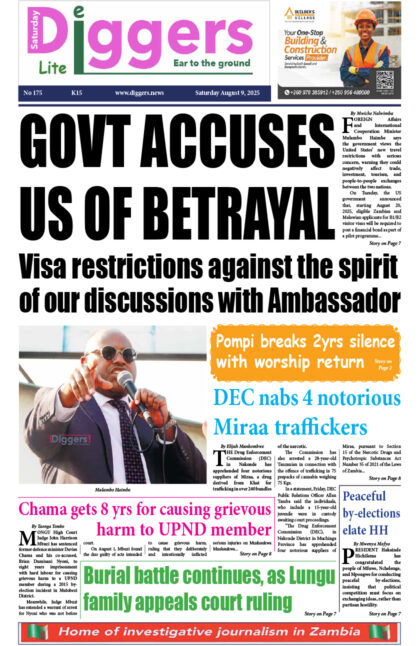Constitutional Court judge Martin Musaluke has strongly condemned all forms of electoral violence in the country and has further reminded Electoral Commission of Zambia that it has wide powers under the law to punish perpetrators of electoral violence which include disqualifying a political party in breach of the Electoral Code of Conduct.
“We take judicial notice that ECZ has wide powers under the Law to punish perpetrators of electoral violence which include, but not limited to, disqualification of a political party in breach of the electoral code of conduct from taking part in an election. It’s time that such powers are invoked so as to preserve life, property, democratic values and principles,” said the learned judge.
We give the Honourable judge a standing ovation for boldly telling the ECZ that they are sleeping on the wheel. The Electoral Commission of Zambia has so much power but it has chosen not to exercise its authority. This is especially the case when the party in power is the culprit. The recent case of Chilubi where the commission says it could not act because there was no official complaint from any stakeholder makes sad reading.
Like we said, the fact that the Electoral Commission of Zambia has the overall responsibility of superintending over elections means they should be observant of the conduct being exhibited by stakeholders, the competing political players. Police are obliged to get instructions from the Electoral Commission to ensure the smooth running of elections in the country. And therefore, the Commission is not supposed to wait until someone makes a formal complaint on malpractice, the opposite should be the case. The Commission must be the one to flag down breaches and punish offenders – and this includes disqualifying them.
It’s sad to imagine that the Electoral Commission of Zambia has never before disqualified any candidate or political party for violence or malpractice, and when we ask them, they say there has never been a case that warranted the Commission to take such a step before. Now, if people are being hacked to death during electoral violence and this doesn’t count, what is going to be more serious in the eyes of the Electoral Commission of Zambia?
But to be fair to Mr Patrick Nshindano, these problems at the Elections House are not new. They actually stem from the fact that the board chairperson of the institution, together with other commissioners, are all appointees of the President. By default, this means they will be loyal to the President who handpicked them into employment. Now, there is a popular saying that in Africa, it is bad manners to talk with food in your mouth. This is where the problems is.
Our submission is that political stakeholders should be part of the Electoral Commission of Zambia board. The country can decide that all political parties with parliamentary representation should have a seat on the Electoral Commission’s policy making table. Alternatively, an electoral stakeholders consultative body can be formed comprising all participating political parties, every two years or so, prior to the general elections to work closely with the Commission. This is one sure way of avoiding such complaints such as the one where the opposition claims they were not consulted on the decision to print the 2021 ballot papers in Dubai.
As long as we leave the status as it is, where everyone who is there is an appointee of the President, we will continue to have problems. In fact, the latest development where the current government has given the ECZ Commissioners security of tenure gives us goosebumps. Ordinarily, it should be a great thing, as it means the Commissioners can now work independently and make democratic decisions rather than political decisions which favour the party in power. But from what we are seeing, the Commission has taken the path of the Judiciary, where some judges are failing to utilise their autonomy.
If the ECZ commissioners have chosen to scratch back the party in power for the permanent jobs they have been offered, it will cause serious disservice to the country. And it will not surprise us that the institution will insist that there is no funding to send observers to witness the ballot printing process in Dubai, yet they have not yet exhausted the other avenues at their disposal.
We have asked ECZ these questions in the past. Have you contacted the United Nations Development Programme for help? Have you contacted the European Union? What about our cooperating partners from the Scandinavian countries? Britain has only just left the European Union, and is keen to demonstrate to African countries like Zambia that it remains committed to supporting democratic programmes. Has its Department for International Development been asked for support? We bet the Electoral Commission of Zambia has not approached any of these institutions, and that is our problem. The Bible says knock and the door shall be opened for you, ask and you shall be given. The Commission is assuming that the doors are closed, yet they have not knocked on any!

























One Response
Thank you.